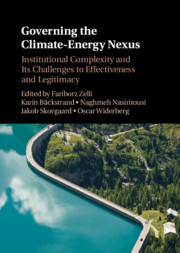This book is a major outcome of an international research project – Challenges and Opportunities in a Fragmented Global Energy and Climate Governance 2015–2018 (CLIMENGO) – funded by the Swedish Energy Agency. In my view, this volume gives an excellent overview of the climate-energy nexus in a global perspective. I have learned a lot that is useful for my work in the Swedish Energy Agency, and the same can be said most likely for civil servants, experts, and policy makers in other public agencies. This book may also help those that consider starting a new organization to identify important gaps to fill, and to navigate in the context of institutional complexity that characterizes the fields of climate and energy governance.
Why study the climate-energy nexus? The Paris Agreement is the latest major intergovernmental treaty that calls for urgent action on climate change, while we know that energy stands for around two-thirds of greenhouse emissions worldwide. It is hence vital to understand which international organizations work in the intersecting fields of climate and energy governance, how the multitude of international institutions is structured and perceived by various stakeholders, and where crucial gaps exist with regard to governance, effectiveness, and legitimacy. The book provides a very valuable and novel set of empirical research findings on these questions: about the plethora of actors and institutional complexity in the climate-energy nexus, about what institutions and actors do, about what they don’t do, and how this matters for the performance and perception of climate and energy governance.
The volume starts with a clear theoretical framework and methodology on how to analyze the climate-energy nexus through four interacting variables – coherence, management, effectiveness, and legitimacy. In the following chapters this framework is applied to the macro, meso, and micro levels for three selected case studies: renewable energy, carbon pricing, and fossil fuel subsidy reform. The contributions address major research gaps and identify important connections between the plurality of institutions and actors within and across these governance subfields. Thereby, these case studies provide an integrated mapping and a consistent analysis of the institutional complexes governing the nexus between climate change and energy.
The understanding of the nexus is further enhanced by other features of the case studies, for example, the timelines and accounts of institutional development that are provided for renewable energy, fossil fuel subsidies reform, and carbon pricing. It is very insightful to see how early some policy areas emerged and began to be populated by institutions. This goes in particular for the subfield of renewable energy, with the International Solar Energy Society as the very first institution, which began operating several decades prior to the commercial availability and affordability of photovoltaic cells. On the other hand, we learn from the case studies about the limited support that other areas have received so far, especially a critical theme such as the reduction or abolishment of fossil fuel subsidies – and this, although international organizations such as the International Energy Agency had repeatedly pointed out the importance of this issue for achieving a reduction of carbon emissions in line with the goals of the Paris Agreement.
In addition to these important and highly insightful mappings and analyses, the volume includes impressive efforts to examine the performance of the climate-energy nexus. To this end, two chapters evaluate the effectiveness and legitimacy of various institutions in this nexus under conditions of institutional complexity.
In light of these achievements and novel findings, I really enjoyed reading this book and I hope many will share my experience.

